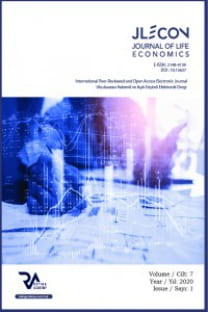SOSYAL MEDYA VE VATANDAŞ ODAKLI KAMU HİZMETİ YAKLAŞIMI
Web 2.0 teknolojileriyle beraber gelişim gösteren sosyal medya uygulamaları hayatın her alanını etkilemeye başlamıştır. Bloglar, YouTube, Facebook, Twitter ve Linkedn gibi uygulamaların kullanıcı sayısı artarken bunları sadece kişiler değil özel ve kamu kurum ve kuruluşlarıyla STK’lar da kullanmaya başlamıştır. Özellikle Yeni Kamu Yönetimi (YKY) yaklaşımıyla beraber bir dönüşüm yaşayan kamu sektöründe sosyal medyanın önemi artmaktadır. YKY çerçevesinde vatandaş odaklı kamu hizmeti anlayışını hayata geçirmeye çalışan devletler için teknolojik ilerlemelerin göz arda edilmesi mümkün görünmemektedir. Bu bağlamda, sosyal medya uygulamaların vatandaş odaklı hizmet anlayışı için ne gibi bir etki yaratacağı, artı ve eksi tarafları ile bu uygulamaların söz konusu hizmet anlayışı çerçevesinde nasıl kullanılabileceği sorularına cevap bulmak gerekmeKtedir. Bu çalışmada da, bu sorular cevaplandırılmaya çalışılarak bir değerlendirme yapılacak ve önerilerde bulunulacaktır.
Anahtar Kelimeler:
Web 2.0, Sosyal Medya, Vatandaş Odaklı Kamu Hizmeti, E-Devlet
SOCIAL MEDIA AND CITIZEN CENTERED PUBLIC SERVICE APPROACH
Social media applications that have developed along with Web 2.0 technologies have begun to affect every aspect of life. As the number of users of applications such as Blogs, YouTube, Facebook, Twitter and Linkedn increased, Not only individualsbut also private and public institutions and organizations with NGOs started to use them. Especially in the public sector, which is transformed with the approach of New Public Management (NPM), the importance of social media is increasing. It seems unlikely that technological advancements will be considered for governments that are trying to pass the citizen-centered public service perception within the framework of NPM. In this context, it is necessary to answer the questions of how social media applications will have an impact on citizen-centered service perception, plus and minus sides and how these applications can be used within the context of that service concept. In this study, an evaluation and suggestions will be made by trying to answer these questions.
Keywords:
Web 2.0, Social Media, Citizen-Centered Public Service, e-Government,
___
- ABDALLAH, S. and KHALİL, A., 2009, “Web 2.0 and E-Governments: An Exploration of Potentials & Realities In The Arab World”, Proceeding of European and Mediterranean Conference on Information Systems (EMCIS2009), Crowne Plaza Hotel, Izmir, July 13-14. AGOSTINO, D., 2013, “Using Social Media to Engage Citizens: A Study of Italian Municipalities”, Public Relations Review, 39, 232-234 AL-BADI, A. H., 2014, "The Adoption of Social Media in Government Agencies: Gulf Cooperation Council Case Study”. Journal of Technology Research, 5(1), 1-26. ATARI, S., STEWART-WEEKS, M. and MCCALLA, J., 2011, Web 2.0 in Next-Generation Government and Governance: A Middle East Point of View. Cisco Internet Business Solutions Group (IBSG). BAKER, F. P., 1995, “Marketing in a Local Authority”, Journal of Marketing Practice: Applied Marketing Science, 1 (4), 73-84. BAUMGARTNER, J. C., & MORRIS, J. S., 2010, “My Facetube Politics: Social Networking Web Sites and Political Engagement of Young Adults”, Social Science Computer Review, 28, 24–44. BERTOT, J. C., JAEGER, P. T., and HANSEN, D., 2012, “The impact of Policies on Government Social Media Usage: Issues, Challenges, and Recommendations”, Government Information Quarterly, 29, 30–40. BERTOT, J.C., JAEGER, P.T. and GRIMES, J.M., 2010, “Using ICTs to Create a Culture of Transparency: e-Government and Social Media as Openness and Anti-Corruption Tools for Societies”, Government Information Quarterly, 27, 264–271. BERTOT, J. C., JAEGER, P. T., MUNSON, S. and GLAISYER, T., 2010a, “Social Media Technology and Government Transparency”, Computer, November, 55-59. BERTOT, J. C., JAEGER, P. T., MUNSON, S., and GLAISYER, T., 2010b, “Engaging the Public in Open Government: The Policy and Government Application of Social Media Technology For Government Transparency”. IEEE Computer, 43(11), 53–59. BRETSCHNEIDER, S. I. and MERGEL, I., 2010, “Technology and public management information systems: Where have we been and where are we going”, Menzel, D. C. and H. J. White (Eds.), The State of Public Administration: Issues, Problems and Challenges, New York: M.E. Sharpe, Inc, 187-203. BRYER, T. A, and ZAVATTARO, S. M., 2011, “Social Media and Public Administration”, Administrative Theory & Praxis, 33(3), 325–340. CANADIAN CENTRE FOR MANAGEMENT DEVELOPMENT, 1999, Citizen Centred Service: Responding to the Needs of Canadians for the Citizen-Centred Service Network. http://www.iccsisac.org/en/pubs/CCHandbook.pdf (Erişim Tarihi: 11.08.2017) CHUN, S. A., SHULMAN, S., SANDOVAL, R., and HOVY, E., 2010,. “Government 2.0. Making Connections Between Citizens, Data and Government. Information Polity”, The International Journal of Government & Democracy in the Information Age, 15, 1‐9.
- Yayın Aralığı: Yılda 4 Sayı
- Başlangıç: 2014
- Yayıncı: Rating Academy
Sayıdaki Diğer Makaleler
AVRUPA BİRLİĞİ’NDE BÖLGESEL KALKINMA AJANSLARINA GEÇİŞ SÜREÇLERİ VE ÜLKE UYGULAMALARI
Didem SAYGIN, Mehlika Özlem ULUTAN
Çağrı HAMURCU, H. Dilek YALVAC HAMURCU
ÖZELLEŞTİRME GELİRLERİNİN EKONOMİK BÜYÜME ÜZERİNDEKİ ETKİLERİ: TÜRKİYE ÖRNEĞİ (1986-2016)
SOSYAL MEDYA VE VATANDAŞ ODAKLI KAMU HİZMETİ YAKLAŞIMI
Sibel CAŞKURLU, Cem BARLAS ASLAN, Eren CAŞKURLU
Oğuz DİKER, Oğuz TAŞPINAR, Yasin SOYLU
AGROTURİZMDE YENİ EĞİLİMLER: ZEYTİNYAĞI TURİZMİ
İşıl ARIKAN SALTIK, Hüseyin ÇEKEN
TÜRKİYE EKONOMİSİNDE PETROL FİYATLARI VE ENFLASYON İLİŞKİSİ: AMPİRİK ANALİZ
